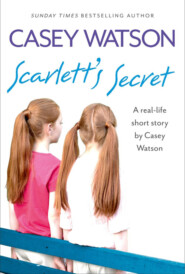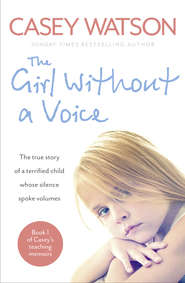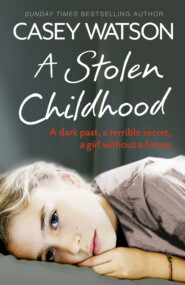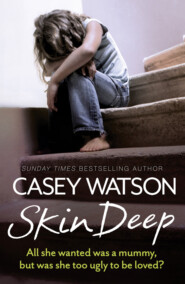По всем вопросам обращайтесь на: info@litportal.ru
(©) 2003-2025.
✖
Just a Boy: An Inspiring and Heartwarming Short Story
Настройки чтения
Размер шрифта
Высота строк
Поля
‘We go back home and make a plan.’
Mike was right, of course. It was completely out of character for Cameron to run away. But even so – even if he’d just gone on a wander – we still faced the grim task of calling Jeremy and telling him our ‘charge’ was no longer under our charge. And by the time we got back, called his number and left a voice message, I was becoming more and more agitated. He hadn’t taken his holdall, but he had taken his stick. Oh, God, I thought, where had he gone?
It was still early – not far past eight yet – so it wasn’t surprising that it was a while before our anxious reveries were interrupted by the sudden sound of ringing, which made us jump. But it wasn’t the phone, it was the doorbell, which we both rushed to get to, to be rewarded by a reassuring bulky shadow beyond the glass.
Mike opened the door. ‘Cameron!’ he exclaimed. ‘Where’ve you been, lad?’
I took in the scene: Cameron, looking sheepish, and an elderly gentleman I vaguely recognised, who introduced himself as Mr Parsons, and who, though looking only slightly less bemused than we were, had a definite twinkle in his eye.
‘This one belong to you?’ he asked, grinning.
‘Yes,’ I said. ‘Yes, he does. Cameron, what happened?’
Cameron’s face was turning the same colour as next door’s roses. ‘I’m so sorry,’ he said, frowning. ‘I feel such an idiot.’
‘Found him a couple of streets away,’ Mr Parsons said, ‘on my way back from getting my paper. So I took him indoors, gave him a drink – it’s a hot old morning to be traipsing the streets, eh? And it took a little time to fathom out where he belonged, but between us we got there, didn’t we, son?’
‘I’m sorry …’ Cameron began again.
Mr Parsons chortled. ‘Sorry? Not a bit of it! Most entertaining Saturday morning I’ve had in a long time, believe me. And a pleasure to meet you, young man!’
Waving Mr Parsons off with our undying gratitude, we bundled Cameron back indoors for a debrief.
‘Where were you off to?’ I wanted to know, trying not to sound like I was chastising him. I was conscious that he’d been with us less than forty-eight hours and seemed to be apologising right, left, and centre.
But it turned out he hadn’t been running away. In fact, the idea brought a smile to his lips. ‘Casey, I think I’m the last person on earth who should try running away from anywhere, don’t you?’
All he’d wanted to do was post a letter. Well, more correctly, a postcard, to his gran. It was the one from the petting zoo which, unbeknown to either Mike or me, he’d had Kieron write and address for him the previous evening, just before going off to do his DJing.
‘I know I didn’t need to,’ he said. ‘I could just as easily have given it to her when I go and see her next week. But Granddad had told me she was feeling low last night, and I was awake and the sun was shining and since I’d passed the letter box with Kieron on Thursday, I knew where it was … And I just thought it would be nice for her to get it brought round in the post. But, somehow – I don’t know how –’
‘You got yourself well and truly lost,’ Mike said, chuckling.
Cameron nodded. ‘Exactly. I should have only been gone two minutes. Except –’ he glanced towards his stick, which was resting beside his leg. ‘Flipping radar,’ he said. ‘Rubbish, it is. Rubbish.’
So in the end, Cameron did leave us on a high note, because we all laughed so hard it even roused Kieron from his slumbers, and we had our full English in the garden just as planned. And I think we all learned something good from our encounter. Cameron that his navigation wasn’t quite as infallible as he thought; that in Mr Parsons we have a very nice neighbour; and well, in my case, that I do have a tendency to panic, because I do – as Kieron’s pointed out time and again over the years – take things so much to heart where people being mean to kids is concerned. Cameron had been quiet because he’d been thinking about his gran, not because of what the ignorant man had said at the bowling alley. He told us he’d be mad to – that he wasn’t worth the head-space. ‘Water off a duck’s back,’ he quipped, when he left us.
‘Or coke down a shirt front!’ Mike corrected, which meant I learned something else: my husband’s jokes really don’t get any better.
We got a lovely thank-you card from Cameron a couple of weeks after he left us, and I shall treasure it always. Inside it was a quote from that most famous of blind people, Helen Keller, and a lovely one for anyone to bear in mind: The only thing worse than being blind is having sight but no vision.
A lesson for us all. And as Mike predicted, an eye-opening two days.
(#uedeb0b1f-79ba-55ce-a98d-c53670a76abe)
The next title in the series. Read an exclusive excerpt now.
Chapter 7
I managed to get hold of Marie straight away.
‘I’m sorry I’ve not called you yet,’ she apologised immediately. ‘I know John’s put you in the picture – at least, I assume he has – has he?’
‘Yes, yes,’ I answered. ‘It’s –’
‘It’s just that the hearing was scheduled for p.m. rather than a.m., so I don’t have any news yet, and –’
Now it was my turn to interrupt. ‘I do,’ I said, getting straight to the point. This was no time for chit-chat. ‘Jenson’s absconded from school.’
Marie groaned. ‘Now, why doesn’t that surprise me?’
‘Exactly,’ I said. ‘So I’m assuming he’s gone to do what he admitted was the plan: meet up with his sister and head home to see Mum.’
‘And of course, she might already be on her way home from the hearing by now, too. I need to get round there. We need to get round there …’
‘Absolutely. So if you can let me have the address?’
Marie reeled it off for me. I didn’t need to write it down. It was local, and I knew it. I just made a mental note of the house number.
‘Okay,’ I said, pulling off my apron. ‘Thanks. I’ll get going, then. Let’s just hope it doesn’t become unpleasant. And what should I say to her if I get there before you?’
‘Which you probably will, because I’m bound to get stuck in traffic. Just keep it light. Tell her who you are and that you were worried about him running off. Tell her you don’t know any more than that. I think that’s the best way.’
This was actually the truth, I thought, as I jumped in my car and fired the engine. And Marie didn’t know much more because she hadn’t yet been told the outcome of the hearing. It was perfectly possible the judge had decided to let the children go home. Either way, Marie had assured me that she’d find out before she got there.
Jenson’s estate was a big sprawling one, built in the fifties or sixties; certainly at a time before everyone had cars. Every road I drove down had a ribbon of them on either side, all of them listing a little, looking like rows of sleeping animals, half up on the pavement, half in the kerb, leaving just a sliver of road to squeeze my car through. I had to park way past the house, which was showing no signs of life – but which perhaps wouldn’t, given this was a sunny early summer afternoon. I hurried back and headed up the front path – there was a gate, but it too was listing – but my knocks on the blue-painted front door produced nothing but an empty echo, which reverberated down the equally empty hallway I could see through the heavily frosted glass.
Not that this meant anything. He wasn’t going to answer the door, was he? If he was smart, which I thought he was, he would have been keeping an eye out. He would want to see who was out there before risking revealing himself. And if he didn’t like what he saw then he would simply lay low – with or without his older sister.
There was little I could do except wait for Marie to arrive. And then, presumably, for Karen to show up. I stepped back from the door and scanned the street. Jenson could be anywhere. He’d probably have dozens of friends he could go to. It was a huge estate, and one I knew well from my days as a school behaviour manager. I used to visit families here regularly, as part of my job involved visiting troubled kids in their home settings and talking to their families about how they could help their kids better. I’d sit and discuss strategies, talk about boundaries and discipline, then I’d help them create reward charts – I’d always come armed with stars and stickers – to help them try and curb their teenagers’ less delightful behaviours.
It seemed a long time ago, now, and in some ways it was. I’d been fostering for almost half a decade now; some very intense years.
I was just reflecting on how much my life had changed since I answered that fostering agency ad when I became aware of a ‘psst!’ sound close to me. I turned to see a woman on the doorstep of the neighbouring semi, silently beckoning that I should step a little closer.
She wore one of those old-fashioned wrap-around aprons that look like dresses, and drew a finger to her lip as I approached. ‘Are you one of the social workers?’ she wanted to know.
I shook my head, and keeping my voice low to match hers I explained that, no, I was Jenson’s foster carer.
‘My name’s Casey,’ I added. ‘Do you know something about his whereabouts?’
She cocked her head back. ‘The lad’s in my garden,’ she told me, ‘waiting for his mum to get home. Playing with my dog. He loves my Sabre, he does. I expect he’s missed him.’
Вы ознакомились с фрагментом книги.
Приобретайте полный текст книги у нашего партнера:
Приобретайте полный текст книги у нашего партнера:











